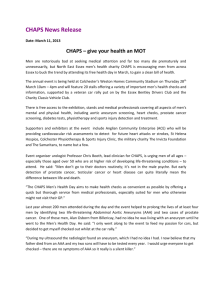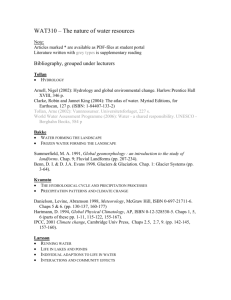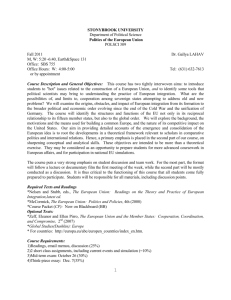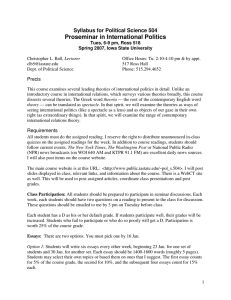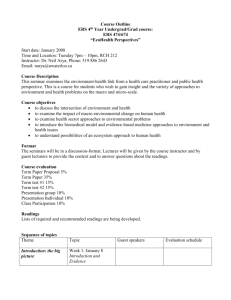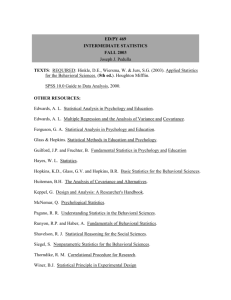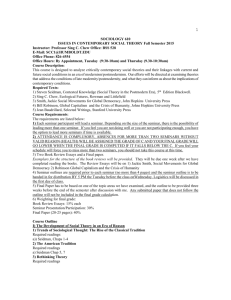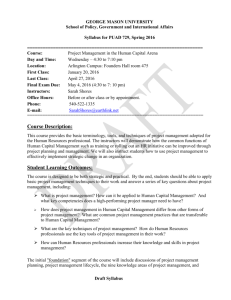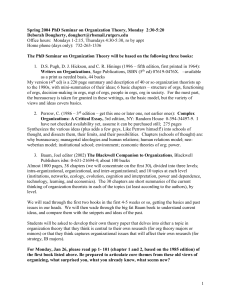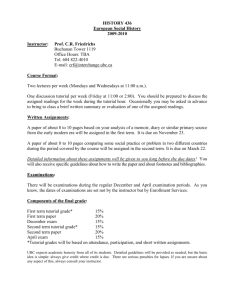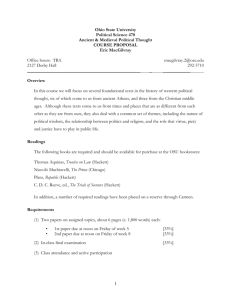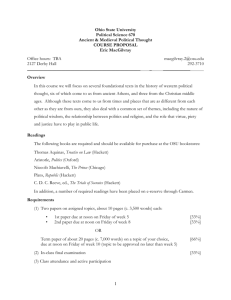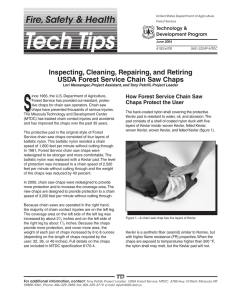course syllabus
advertisement
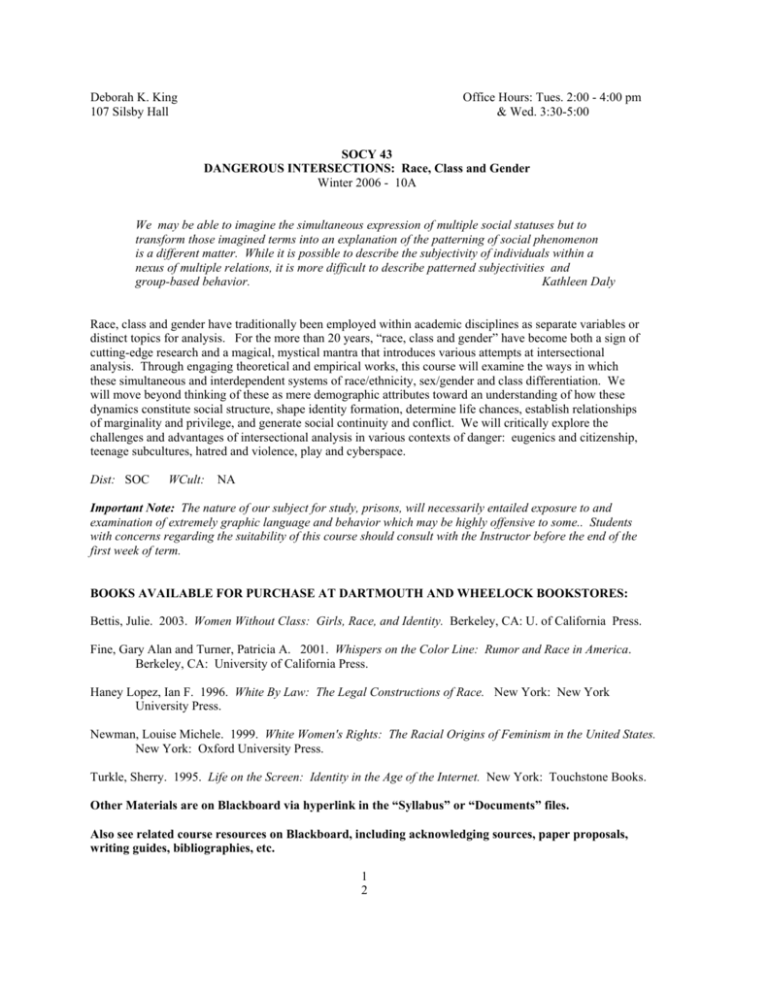
Deborah K. King 107 Silsby Hall Office Hours: Tues. 2:00 - 4:00 pm & Wed. 3:30-5:00 SOCY 43 DANGEROUS INTERSECTIONS: Race, Class and Gender Winter 2006 - 10A We may be able to imagine the simultaneous expression of multiple social statuses but to transform those imagined terms into an explanation of the patterning of social phenomenon is a different matter. While it is possible to describe the subjectivity of individuals within a nexus of multiple relations, it is more difficult to describe patterned subjectivities and group-based behavior. Kathleen Daly Race, class and gender have traditionally been employed within academic disciplines as separate variables or distinct topics for analysis. For the more than 20 years, “race, class and gender” have become both a sign of cutting-edge research and a magical, mystical mantra that introduces various attempts at intersectional analysis. Through engaging theoretical and empirical works, this course will examine the ways in which these simultaneous and interdependent systems of race/ethnicity, sex/gender and class differentiation. We will move beyond thinking of these as mere demographic attributes toward an understanding of how these dynamics constitute social structure, shape identity formation, determine life chances, establish relationships of marginality and privilege, and generate social continuity and conflict. We will critically explore the challenges and advantages of intersectional analysis in various contexts of danger: eugenics and citizenship, teenage subcultures, hatred and violence, play and cyberspace. Dist: SOC WCult: NA Important Note: The nature of our subject for study, prisons, will necessarily entailed exposure to and examination of extremely graphic language and behavior which may be highly offensive to some.. Students with concerns regarding the suitability of this course should consult with the Instructor before the end of the first week of term. BOOKS AVAILABLE FOR PURCHASE AT DARTMOUTH AND WHEELOCK BOOKSTORES: Bettis, Julie. 2003. Women Without Class: Girls, Race, and Identity. Berkeley, CA: U. of California Press. Fine, Gary Alan and Turner, Patricia A. 2001. Whispers on the Color Line: Rumor and Race in America. Berkeley, CA: University of California Press. Haney Lopez, Ian F. 1996. White By Law: The Legal Constructions of Race. New York: New York University Press. Newman, Louise Michele. 1999. White Women's Rights: The Racial Origins of Feminism in the United States. New York: Oxford University Press. Turkle, Sherry. 1995. Life on the Screen: Identity in the Age of the Internet. New York: Touchstone Books. Other Materials are on Blackboard via hyperlink in the “Syllabus” or “Documents” files. Also see related course resources on Blackboard, including acknowledging sources, paper proposals, writing guides, bibliographies, etc. 1 2 Course Requirements Much of the work of this course will involve our collective examination and discussion of secondary as well as primary sources -- print, visual and recorded. Students are expected to attend all class sessions as well as any special sessions, to complete reading assignments in a timely fashion and to participate meaningfully in every class meeting. There will also be required attendance at several film screenings or campus events that are scheduled for outside of class time. 10% Attendance & Participation Everyone is expected to attend class sessions regularly and come prepared to engage, actively and critically, the assigned readings. Please come to class with comments, questions, critiques of the assigned readings, as well as relevant examples from current events (i. e. read the newspaper) and popular discourse. 20% Completion of two brief (2-3 page) critical report Reports will provide an opportunity to use the intersectional approach to analyze various features of daily life in society. Exercise options to be posted on Blackboard during the term. You must complete at least one of these assignments prior to the midterm. ( 10% each) 30% Completion of a take-home, mid-term examination 40% Completion of a substantive research paper (10-15 pages, 25-30 MALS) This paper should demonstrate your competence in employing an intersectional approach. A research paper proposal, identifying your topic and including a bibliography must be approved by the instructor. Guidelines for the research paper proposal will be posted on Blackboard. Course Policies Honor Principle Academic work is simultaneously a collaborative and an independent enterprise. Consulting with others and using their questions, ideas, findings, and interpretations are integral parts of intellectual inquiry. The laborious, critical and creative work of developing one's own understandings is equally important. In this course, you will have opportunities to engage in both endeavors. Therefore it is essential that you maintain the integrity of each. Class members are encouraged to discuss readings, lectures and other course materials with one another. However examinations, exercise report, and the research paper must be your own independent work; in which you appropriately cite the intellectual ideas and products of others (including other class members as well as readings and my lectures). Please use a comprehensive reference book on acknowledging sources; links are posted under “Documents” in Blackboard. You should familiarize yourself with Dartmouth College's Academic Honor Principle regarding honesty in the completion of course examinations, research papers, and exercises (see pages 154-156 of the 2000-2001 Student Handbook, plus the Standards of Conduct regulations on computing resources and library privileges). This Principle commits us to individual responsibility and fairness in all course work; and prohibits cheating on exams, fabricating research, plagiarizing papers, submitting the same paper for credit in two courses without authorization, buying papers, submitting fraudulent documents, computing abuses and forging signatures. Remember: Plagiarism is the borrowing of the words or the ideals of another person without proper acknowledgment. Please consult Sources: Their Use and Acknowledgment or speak with the professor. 3 Course Policies, cont. Late Submissions The submission of assignments is expected on the indicated “due date” and during that day’s class meeting (unless otherwise stated). Requests for a late submission should be made to the instructor prior to the due date. Request for changes in test dates or for make-up examinations will be handled on a caseby-case basis. Please note that grades on non-approved late submissions will be penalized. Students with Disabilities Students with learning or other disabilities are encouraged to meet with the professor during the first week of the term to discuss any academic assistance or accommodations you may require. Non-native English Speakers Students who speak English as a second language are encouraged to meet with the professor during the first week of the term to discuss any assistance you may require. Blitzmail & Fax Please note that I typically read and answer my blitz mail once a day during the work week (i. e. Mon. – Fri.), but not necessarily according to any schedule. As a rule, I am not accessible via email during the weekends. Course assignments, examinations and research papers nay not be submitted by blitz or fax. (unless otherwise so instructed). Cell phones, PDAs, iPods, & MP3s The use of these and other electronic communication devices and/or software (i. e. emails, text messages, etc.) are prohibited during class sessions & required events. Please turnoff cell phones and music players. Repeated disregard of this policy will lead to a reduction in final grade. Schedule of Readings & Assignments Jan. 5 Course overview PART I LEARNING TO THINK RACE, GENDER & CLASS -- SIMULTANEOUSLY Jan. 10 The Dangers of Intersectionality: A Case Study & A Conceptual Road Map Kwan, Peter. "Intersections of Race, Ethnicity, Class, Gender & Sexual Orientation: Jeffrey Dahmer and the Cosynthesis of Categories" Hastings Law Journal v48 August 1997 Bonilla-Silva, Eduardo. “The essential social fact of race,” American Sociological Review. Dec 1999.Vol.64, Iss. 6; 899-906 PART II BUILDING A BETTER NATION?: Science, Citizenship and Civilization Jan. 12 Eugenics and the Pre-requisites of Citizenship: Whiteness and/or Property Lopez, Ian Haney. White by Law: The Legal Construction of Race, Chaps. 1 - 4 Calavita, Kitty, "The Paradoxes of Race, Class, Identity, and "Passing": Enforcing the Chinese Exclusion Acts, 1882-1910," Law & Social Inquiry v25 n1 2000 History of Race In Science http://www.racesci.org/ Video: Race: The Power of An Illusion Episode 2 Jan. 17 The Gendering and Classing of Immigration Lopez, White by Law, Chaps. 5 - 7 Harris, Cheryl, "Whiteness as Property" in Harvard Civil Rights- Civil Liberties Law Review v160 582 1990 A More Perfect Union: Japanese Americans & the U. S. Constitution http://americanhistory.si.edu/perfectunion/experience/index.html Jan. 19 Social Darwinism and the Pre-Requisites of Citizenship: Maleness and/or Civilization Newman, Louise Michele. 1999. White Women's Rights: The Racial Origins of Feminism in the United States. Introduction, Chaps. 1 – 3 The American Eugenics Movement http://www.eugenicsarchive.org/eugenics/ Jan. 24 Treading on Social Evolution: The Racing and Classing of Suffrage Newman, White Women's Rights. Chaps. 5 – 6 and Conclusion Chon, Margaret and Arzt, Donna, “Walking While Muslim,” 68 n2 Law and Contemporary Problems 215 Spring 2005:215-254 PART II POST-INDUSTRIAL PLAYGROUNDS: CLASS, CULTURE & PLAYING AT THE MARGINS Jan. 26 Negotiating Boundaries: The Pleasures & Risks of Differences Bettie, Julie. 2003. Women Without Class: Girls, Race and Identity, Chaps. 1 - 3 Kelley, Robin D. G. “Playing for Keeps: Pleasure and Profit on the Postindustrial Playground,” in The House that Race Built: Black Americans, U. S. Terrain, edited by Wahneema Lubiano. (on reserve) McGuffey, C. Shawn and Rich, B. Lindsay. "Playing in the Gender Transgression Zone: Race, Class and Hegemonic Masculinity in Middle Childhood," Gender & Society v13 n5 1999: 608-627. January 26, 2006 Nan Aron, Esq., President, Alliance for Justice "The Politics of Judicial Selection and the Future of the Supreme Court" 4:30 PM ~ Filene Auditorium, Moore Hall Jan. 31 Serving Burgers, Saving Face: Fast Food Hassles Bettie, Women Without Class, Chaps. 4 - 7 Giuffre, Patti A. and Williams, Christine L. "Boundary Lines: Sexual Harassment in Restaurants" in Gender & Society v8 1994: 378-401 PART III Feb. 2 FEASTS OF BLOOD, RUMORS OF HATE The Cultivation of Hate Patterson, Orlando, "Feasts of Blood: 'Race' Religion and Human Sacrifice in the Postbellum South" in Rituals of Blood Part II, pgs. 171-232 in Rituals of Blood Consequences of Slavery in Two American Centuries. (on reserve) Allen James et. al., Without Sanctuary: Lynching Photography in America http://www.journale.com/withoutsanctuary Blee, Kathleen. "Becoming a Racist: Women in Contemporary Ku Klux Klan and Neo-Nazi Groups." Gender & Society v10 n6 December 1996: 680-702 Feb. 7 A Dangerous Intersection Johnson, Paula C. "The Social Construction of Identity in Criminal Cases: Cinema Verite and the Pedagogy of Vincent Chin," Michigan Journal of Race & Law, Summer 1996 v1: 347 Chen, Anthony S. “Lives at the Center of the Periphery, Lives at the Periphery of the Center: Chinese American Masculinities and Bargaining with Hegemony,” Gender & Society V13 n5 October 1999: 584-607. Video: Who Killed Vincent Chin? Feb. 9 No new readings Feb. 14 The Structural Relations of Hostile Emotions Fine, Gary Alan and Turner, Patricia. 2001. Whispers on the Color Line: Rumor and Race in America, Introduction, Chaps. 1 - 3 Katz, Jack. “Pissed Off in L. A.” Chap. 1 in How Emotions Work. 1999. Chicago: University of Chicago Press. Pp. 18-86 (on reserve) Video: Tale from Cosmic Slop Feb. 16 Fine and Turner. Whispers on the Color Line, Chaps. 3 & 4 ‘Reaping the Whirlwind,” SPLC Intelligence Report Winter 2001 Issue 104 Video: Space Traders Feb. 21 Rumors and Realities of Hate Fine and Turner. Whispers on the Color Line, Chaps. 4 - 8 Ferber, White Man Falling, Chaps. 6-9 (on reserve) Video: Tales from the Hood PART IV WHERE NO ONE HAS GONE BEFORE: IMAGINING ALTERNATIVE FUTURE Feb. 23 What Does It Matter?: Morphing into or Passing as the Other Turkle, Sherry. 1997. Life on the Screen: Identity in the Age of the Internet, Introduction, Chaps. 1, 2, 7 –10 Feb. 28 The Limits of Virtuality Chon, Margaret "Erasing Race?: A Critical Race Feminist View of Internet IdentityShifting," Journal of Gender, Race & Justice. Spring 2000 n3: 439 - ____ Kang, Jerry. "Cyber-Race," Harvard Law Review v113 March 2000: Mar. 2 Disrupting Identities and Inequalities Turkle, Sherry, "Drag Net: Switching Sex Roles on Internet's Multi-users Domains," Utne Reader n 89 Sept/Oct 1998: 50-5 and Wilkins, Amy C. “Puerto Rican Wannabes: Sexual Spectacle and the Marking of Race, Class, Gender Boundaries,” Gender & Society, V 18, N 1, 2004: 103-121 Mar. 7 Synopsis of Research Papers Mar. 14_ Research Paper Due by 9:00 a. m. Deliver to 111 Silsby or 107 Silsby
